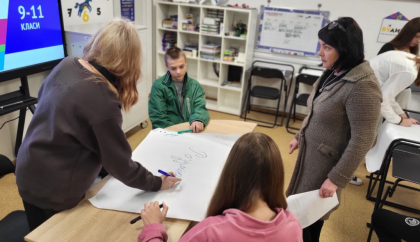
Charity fairs, weaving of nets, eco discussions, collection drives, and the creation of school volunteer clubs – these initiatives concluded the School DOCU/WEEK 2024 at various educational institutions. Organized by the DOCU/CLUB Network of the NGO Docudays, this year's DOCU/WEEK focused on human rights and volunteering.
This year, volunteering was added to the list of human rights. The volunteer movement has become a powerful force, uniting Ukrainians during the war and making them more resilient in the face of difficulties. Watching thematic films allowed students to learn more about the importance of volunteering for society and even inspired them to create their own volunteer projects.
Olena Brazhenko, psychologist and social pedagogue at Izyum Lyceum №11 of the Izyum City Council (Kharkiv region), and Maria Kakhniy, ecology teacher and organizer of the Zhuravne Lyceum School (Lviv region), shared their experiences of the School DOCU/WEEK and its results with the New Ukrainian School.
This article will tell you:
-
how the lyceums organized DOCU/WEEK 2024;
-
why watching and discussing documentary films is beneficial in the educational process;
-
what films were shown to the students;
-
what students’ projects were inspired by these films.
THE POWER OF REAL PEOPLE'S STORIES INSTEAD OF ABSTRACT CONCEPTS
This is not the first time Olena Brazhenko has participated in this educational project with the students of the Izyum Lyceum №11. According to her, with the help of short documentaries that can be easily integrated into many subjects, students can better understand fundamental values and human rights using real-life examples. This makes the learning process easier and more approachable, and discussions that follow the screenings teach students to express their opinions and participate in debates.
“When I saw that this year's topic was volunteering, I decided to join again. At a time when the war is testing our society, it is important for teachers not only to impart knowledge, but also to develop students’ skills of support, compassion and active citizenship. With thematic documentaries, conversations on this topic cease to be abstract, because the films tell real people’s stories,” says Olena.
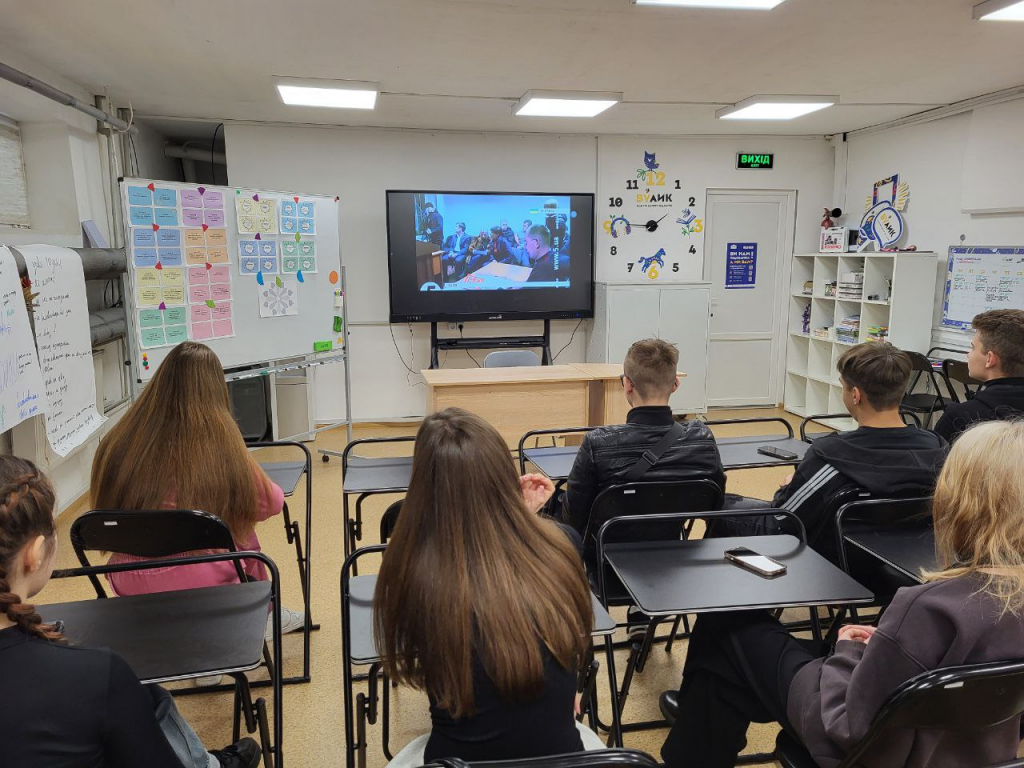 Students of Izyum Lyceum №11 watching a documentary in the bomb shelter of the educational center
Students of Izyum Lyceum №11 watching a documentary in the bomb shelter of the educational center
As for the students of the Zhuravne school, they participated in the School DOCU/WEEK for the first time, adds Maria Kakhniy. She says that she has long been interested in documentary films and their use in arousing students' interest in important topics. Thus, with the support from her colleagues, Maria also joined the screening of documentaries at her lyceum.
At both schools, the week was centered on the screenings of three documentaries from the DOCU/CLUB Network collection of the NGO Docudays. Teachers could integrate them into lessons, class hours, clubs, etc.
According to Olena Brazhenko, her 7-11-graders were especially active in discussing the documentary Euromaidan SOS by Serhiy Lysenko. Euromaidan SOS is an initiative of young human rights defenders and activists, which emerged on November 30, 2013, after some students were beaten on Euromaidan. The very next day, they opened a hotline for victims and another for volunteer lawyers to provide legal services and defense in courts to protesters. Now they are documenting war crimes, engaging in international advocacy, and advocating for the release of political prisoners.
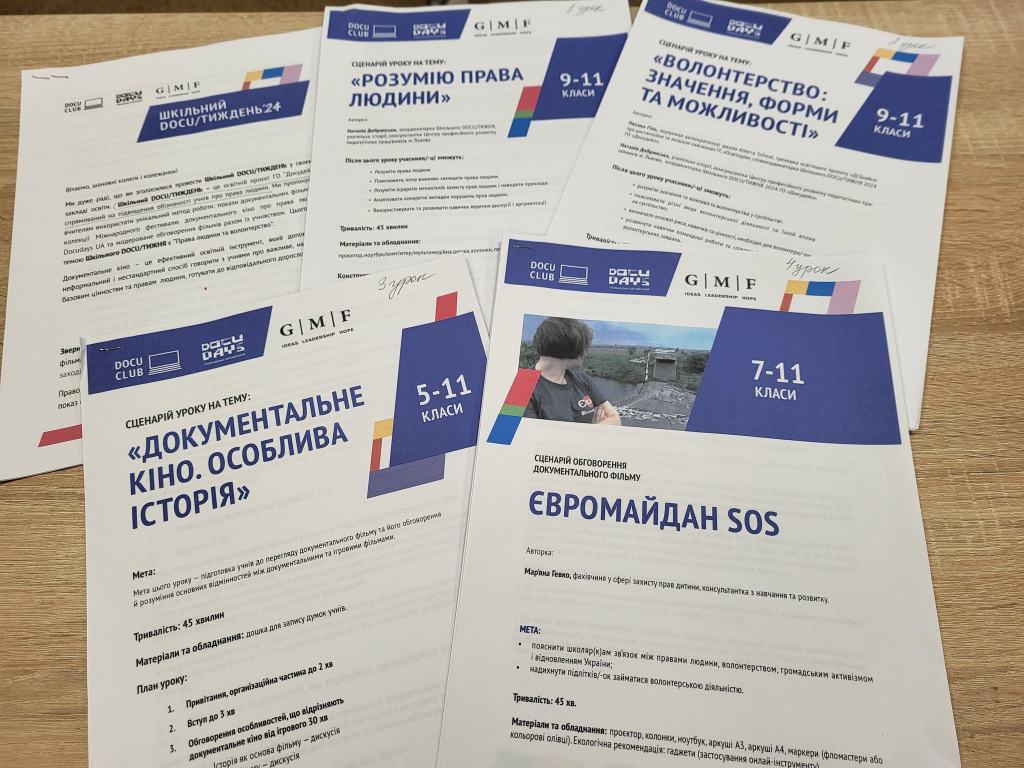
Scripts and other materials for film discussions provided by the project
“The film made a profound impression on everyone. It showed how ordinary people, united, defend their rights and freedoms under threat. It was not only about history, but also about willpower, dignity, and the importance of mutual support. Students started reflecting more deeply on how their actions can affect society. The discussions after the screening helped them not only comprehend what they had seen but also share their emotions and thoughts about current events. Many of them realized how one act or participation in volunteering can change people's lives,” says Olena.
Other films that the students watched included:
Language directed by Serhiy Lysenko (for students in grades 5-8). The film tells how activists organized free language courses for everyone in the East and South of Ukraine, brought book fairs and music bands, and organized meetings with contemporary Ukrainian authors at those localities.
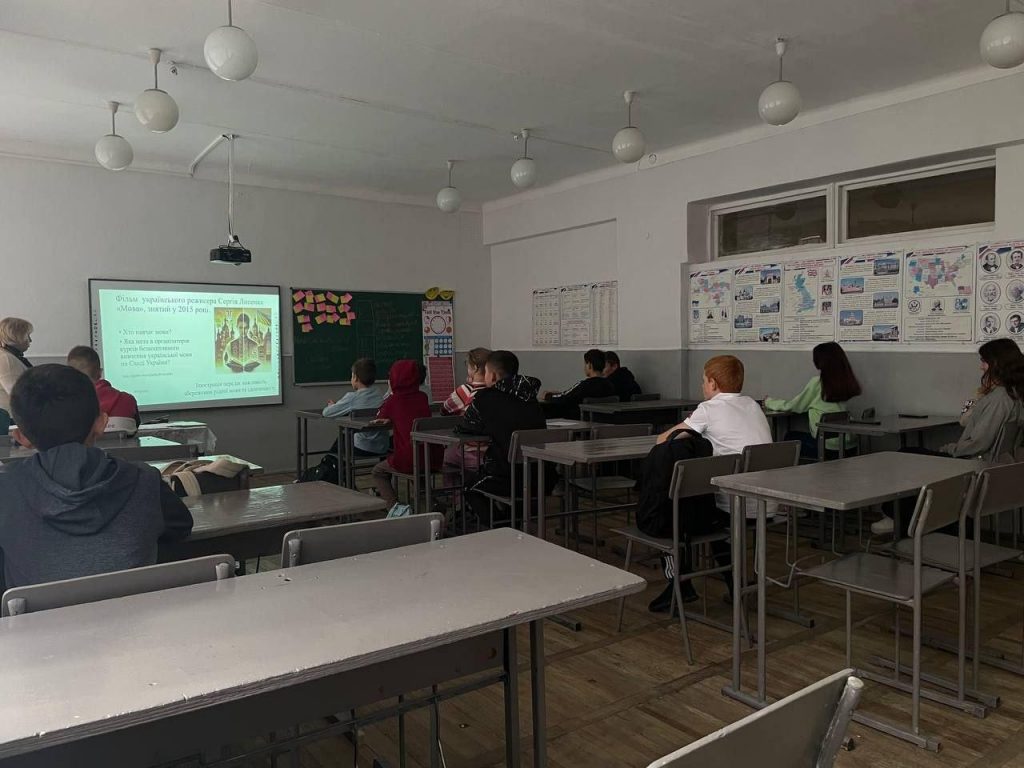
Students of the Zhuravne lyceum during the screening of Language
Tales of a Toy Horse by Ulyana Osovska and Denys Strashnyi (for students in grades 9-11), which tells the story of Anatoliy Lyutyuk, a former anti-Soviet activist who is now an artist and monk. He used to live in an old stone-made tower in Tallinn, but the outbreak of the Russian-Ukrainian war in 2014 forced him to leave the Estonian capital and go on a volunteer mission to the frontline towns and villages of Ukraine.
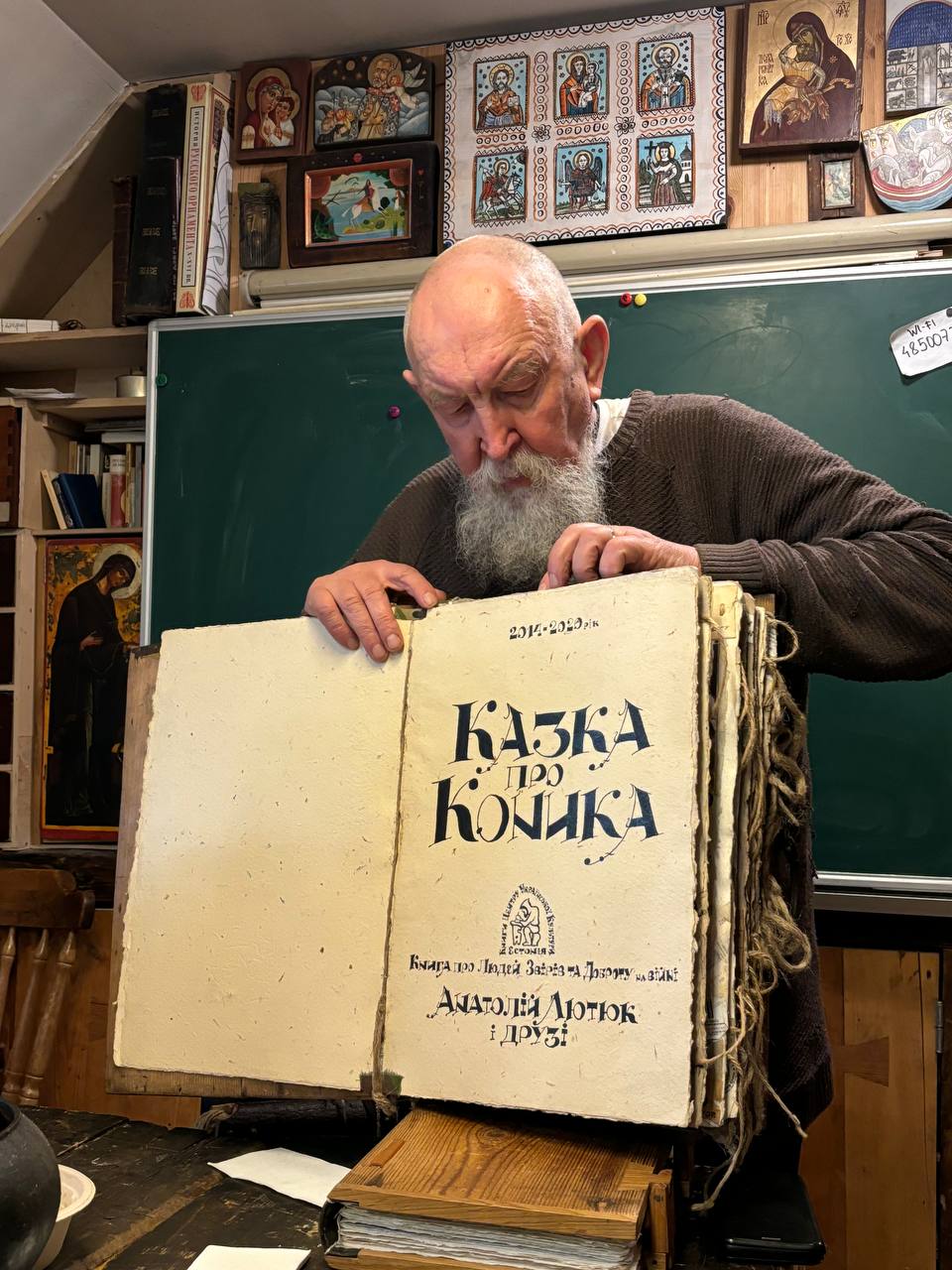
Anatoliy Lyutyuk presents Tales of a Toy Horse to the participants of the media literacy project in Tallinn, Estonia, in October 2024. Photo: Viktoriya Koval
After the screening, students participated in moderated discussions where they expressed their opinions, analyzed the film plots, and discussed human rights issues, adds Maria Kakhniy. According to her, such activities help spark students’ interest in important topics and make them realize that everyone has the right to respect and protection.
Olena Brazhenko notes that these films also showed students various forms of volunteering, from direct assistance to informational and psychological support. Volunteering is not limited to fundraising or material aid; it also includes a moral component, educational campaigns, and more. Students began to see volunteering as part of their personal responsibility to society.
“Many children told me that watching the documentary helped them see civic engagement in a new light and motivated them to take small actions to improve the school environment and help others. They learned how to work in groups, analyze situations, express their opinions, and actively participate in discussions. This experience left them with a sense of unity and a belief that even small steps can make a big impact,” Olena shares.

Olena Brazhenko’s students during group work
She adds that watching documentaries on volunteering has grown into students' own volunteer projects. The lyceum students began to create mini-projects aimed at helping the local community and supporting the school, such as organizing collecting drives for those in need and events to boost morale. The lyceum also plans to organize a school volunteer club that would regularly engage in volunteer projects both within and outside the school.
Students of the Zhuravne Lyceum School also began creating their own volunteer projects during the DOCU/WEEK, says Maria Kakhniy. Among the ideas the children proposed were:
-
Holding a charity fair to raise funds
-
Weaving nets and making trench candles
-
Helping primary school children with their studies
-
Organizing a community of volunteers
-
Helping animals
-
Tutoring
-
Conducting eco-tolokas (environmental clean-up events)
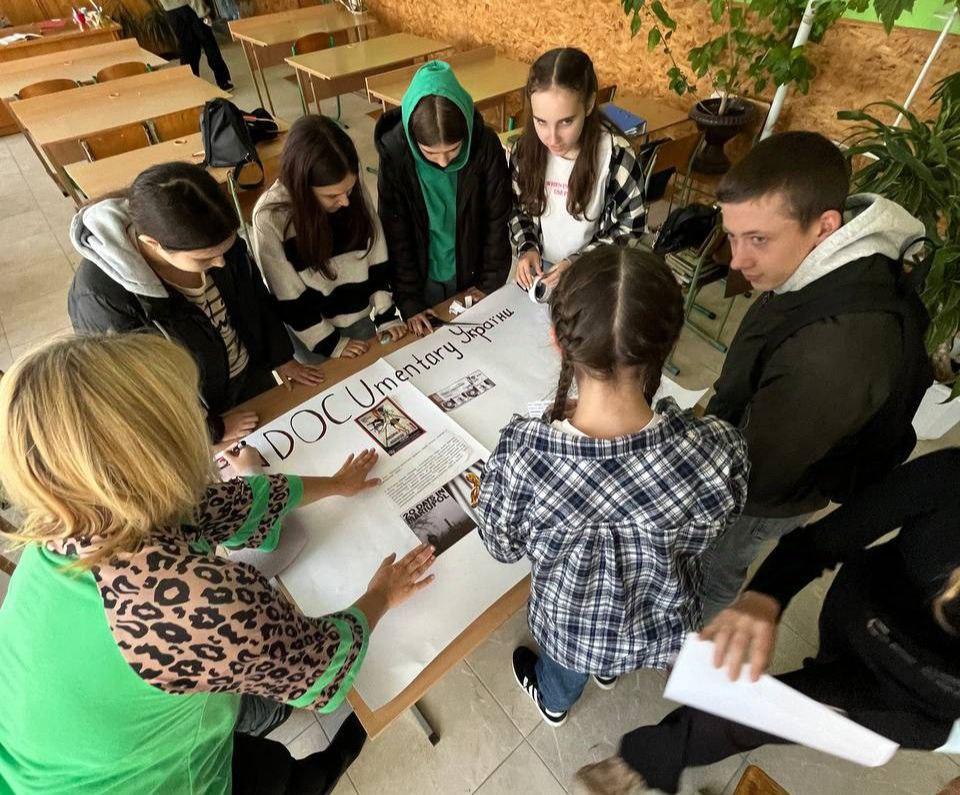
Students of the Zhuravne Lyceum School work on their own projects
“In order for the students to learn more about the process of volunteering firsthand, we organized a meeting with volunteers Mykola Lipkovskyi and Myroslava Yurova at the lyceum at the end of DOCU/WEEK. They shared their own stories about helping our military and answered the students’ questions. For many children, such a heartfelt conversation was a real inspiration, as they realized that volunteering knows no age limits and can start with the smallest actions,” says Maria.
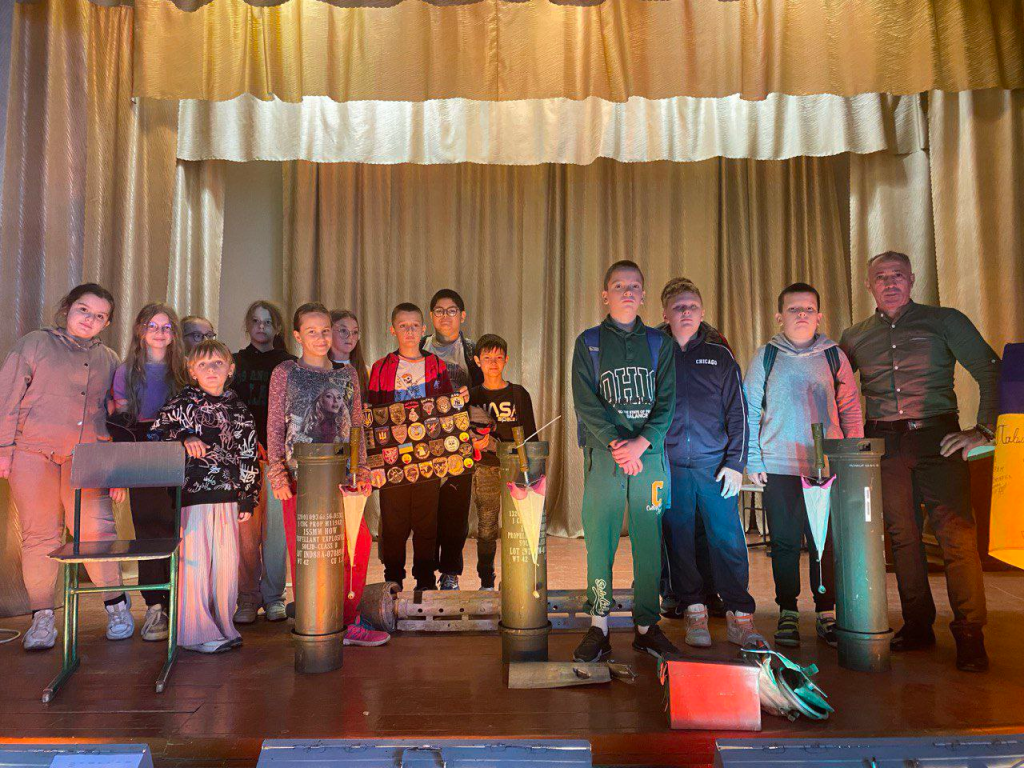
Meeting with volunteers at Zhuravne Lyceum School
According to her, the students are already actively working to turn their initiatives into reality. The teachers at the lyceum also plan to establish a permanent documentary film club at the school.
On December 5, International Volunteer Day, both institutions will organize an exhibition where students will share their first volunteer projects and present works that highlight their reflections and experiences during the DOCU/WEEK. This event aims to inspire others to participate in similar initiatives and to turn the school into a place where real citizens are being formed, who respect the rights of others and are ready to help, emphasizes Maria Kakhniy.
“Participation in the DOCU/WEEK left everyone with a sense of unity and a belief that even small steps can make a big impact. The project became not just an educational event, but also a valuable lesson for our school community, inspiring us to support active citizenship and cooperation,” summarizes Olena Brazhenko.
Iryna Troyan, New Ukrainian School
The School DOCU/WEEK project was implemented with the financial support of the German Marshall Fund of the United States of America. This publication is the sole responsibility of the New Ukrainian School and NGO Docudays and does not necessarily reflect the position of the German Marshall Fund of the United States.
All news


